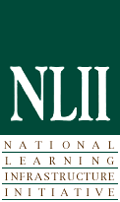

Teaching Practices
Design Implications
Technology Uses
Learning Activities
Mapping the Learning Space:
Deeper Learning and Learning Theories
This section of the Learning Space map explores current research in learning theory, including effective practices for understanding and retention. The five principles for deeper learning put forward on these pages provides a quick summarization of some current theorists on deeper learning, and access to a number of their readings. The summaries of the literature and theories were developed by the NLII Fellows Colleen Carmean and Jeremy Haefner as part of a larger research project on best practices in online learning.
The theorists selected may be controversial, as is the very definition of "deeper learning" but throughout learning theory, the same evidence continues to emerge on conditions and responses to the practice of learning. In regard to meaning of deeper learning, and for our narrow purposes, we like to use DiSessa's (2000) assertion that deeper learning occurs when students can “learn much more, learn it earlier and more easily, and fundamentally, learn it with a pleasure and commitment that only a privileged few now feel toward school learning."

What might need to be true for this kind of learning to take place? Our research leads to a number of theorists, practices and predictions that we cite here, to a number of links that continue to explore conditions for meaningful learning, and to a few simple practices that contribute to a more learner-centered experience in higher education.
The discussion will continue, and the ELI invites interested parties to
join them in continuing discussions that could contribute to a deeper understanding of transforming the learner-centered experience.
A more in-depth exploration of the five principles for those interested in
the online environment can be found in the Carmean
and Haefner article "Mind Over Matter: Transforming Course Management
Systems in Effective Learning Environments",
EDUCAUSE Review, Nov/Dec 2002.
Literature is vast on the topic of learning, cognition and instructional design theory (see a brief overview in theories and readings). The need for learning environments that engage, motivate, and allow learners to take responsibility for and apply their learning continues to dominate the literature, old and new. A summary of findings within the literature is found in a table created by Carmean and Haefner to capture the language and meaning of diverse theories.
This work on the nature of meaningful learning is an attempt to summarize and find common ground for understandings across a vast field of research theory and fields of thought. Those wishing a more in-depth resource on the many theories enumerated in the fields of learning and instructional design might want to visit the Theory into Practice (TIP) site for access to the different frameworks that make up much of the foundations of instructional design literature.